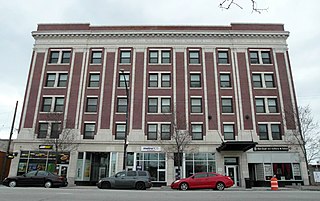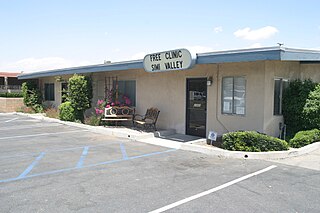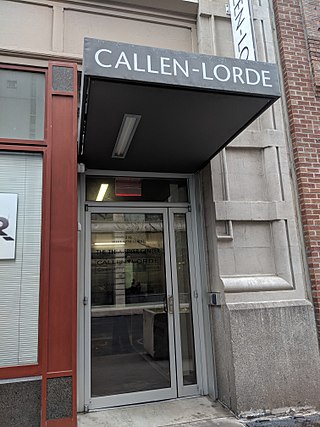
The AIDS epidemic, caused by HIV, found its way to the United States between the 1970s and 1980s, but was first noticed after doctors discovered clusters of Kaposi's sarcoma and pneumocystis pneumonia in homosexual men in Los Angeles, New York City, and San Francisco in 1981. Treatment of HIV/AIDS is primarily via the use of multiple antiretroviral drugs, and education programs to help people avoid infection.

The GMHC is a New York City–based non-profit, volunteer-supported and community-based AIDS service organization whose mission statement is to "end the AIDS epidemic and uplift the lives of all affected." Founded in 1982, it is often billed as the "world's oldest AIDS service organization," as well as the "nation's oldest HIV/AIDS service organization."

Woodlawn, on the South Side of Chicago, Illinois, is one of Chicago's 77 community areas. It is bounded by Lake Michigan to the east, 60th Street to the north, Martin Luther King Drive to the west, and 67th Street to the south. Both Hyde Park Career Academy and the all-boys Catholic Mount Carmel High School are in this neighborhood; much of its eastern portion is occupied by Jackson Park. The Woodlawn section of the park includes the site of the planned Obama Presidential Center, an estimated $500 million investment. The northern edge of Woodlawn contains a portion of the campus of the University of Chicago.

A free clinic or walk in clinic is a health care facility in the United States offering services to economically disadvantaged individuals for free or at a nominal cost. The need for such a clinic arises in societies where there is no universal healthcare, and therefore a social safety net has arisen in its place. Core staff members may hold full-time paid positions, however, most of the staff a patient will encounter are volunteers drawn from the local medical community.

Khayelitsha is a township in Western Cape, South Africa, on the Cape Flats in the City of Cape Town Metropolitan Municipality. The name is Xhosa for New Home. It is reputed to be one of the largest and fastest-growing townships in South Africa.
The Common Ground Health Clinic is a non-profit organization that provides health care in Algiers and Gretna, Louisiana. Common Ground Health Clinic provides programs to address community health care needs through collaborative partnerships. The clinic started on September 9, 2005, just days after Hurricane Katrina devastated the Gulf Coast.

Callen-Lorde Community Health Center is a primary care center located at 356 West 18th Street in New York, New York, with satellite locations in Brooklyn and The Bronx. Callen-Lorde also provides comprehensive mental health services at The Thea Spyer Center, located at 230 West 17th Street. Callen-Lorde is dedicated to providing medical health care to the city's LGBTQ population without regard to ability to pay. It is named in honor of Michael Callen and Audre Lorde.
The United States Preventive Services Task Force (USPSTF) is "an independent panel of experts in primary care and prevention that systematically reviews the evidence of effectiveness and develops recommendations for clinical preventive services". The task force, a volunteer panel of primary care clinicians with methodology experience including epidemiology, biostatistics, health services research, decision sciences, and health economics, is funded, staffed, and appointed by the U.S. Department of Health and Human Services' Agency for Healthcare Research and Quality.
GMFA is a British health promotion charitable project that campaigns to improve gay men’s health. Its core interventions tackle issues including HIV, AIDS and other areas of sexual health. GMFA is part of LGBT HERO, the health equality and rights organisation for LGBTQ+ people.
Calcutta Rescue is a charity based in Kolkata, India, founded by Jack Preger and registered under the West Bengal societies act. It runs medical, educational and support services to disadvantaged people in West Bengal. It also imparts vocational training to ex-patients and underprivileged people.

In precolonial Ghana, infectious diseases were the main cause of morbidity and mortality. The modern history of health in Ghana was heavily influenced by international actors such as Christian missionaries, European colonists, the World Bank, and the International Monetary Fund. In addition, the democratic shift in Ghana spurred healthcare reforms in an attempt to address the presence of infectious and noncommunicable diseases eventually resulting in the formation of the National Health insurance Scheme in place today.
SHAWCO, the Students' Health and Welfare Centre's Organization, is a student-run NGO based at the University of Cape Town that seeks to improve the quality of life for individuals in developing communities within the Cape Metropolitan area.

AIDS Services of Austin (ASA) is a non-profit AIDS service organization that addresses HIV and AIDS in Central Texas. Founded in 1987, ASA is the region's oldest and largest community-based organization addressing the local AIDS crisis. Annually, they provide direct care services to over 1,500 people and HIV prevention education to over 10,000 people.
Research shows many health disparities among different racial and ethnic groups in the United States. Different outcomes in mental and physical health exist between all U.S. Census-recognized racial groups, but these differences stem from different historical and current factors, including genetics, socioeconomic factors, and racism. Research has demonstrated that numerous health care professionals show implicit bias in the way that they treat patients. Certain diseases have a higher prevalence among specific racial groups, and life expectancy also varies across groups.

Mazzoni Center is a 501(c)(3) nonprofit health care provider in Philadelphia, Pennsylvania, that serves the LGBT community.
The Academic Model Providing Access to Healthcare (AMPATH) is an academic medical partnership between leading North American academic health centers, primarily led by the Indiana University School of Medicine in Indianapolis, Indiana, and the Moi University School of Medicine based in Eldoret, Kenya. It is the first integrated healthcare model to be established in Africa, encompassing both medical treatment and pharmaceutical provisions. The program aims to deliver comprehensive HIV care services and is guided by a three-fold mission: providing care, conducting research, and offering training opportunities. Currently, AMPATH serves a population of 3.5 million individuals, operating over 60 clinics in urban and rural areas of Western Kenya.
Madwaleni Hospital is a Provincial government funded hospital near rural Elliotdale, Eastern Cape in South Africa.
Eric E. Whitaker is a prominent African-American physician, public health practitioner, and health policy expert. He is a close friend of President Barack Obama.
The San Francisco model of AIDS care began in 1983 in wards 86 and 5B of San Francisco General Hospital. The focus of this model was not only on the health of each patient with AIDS, but also on the well-being of each person. As AIDS was beginning to be treated as a significant epidemic, San Francisco General Hospital recognized the need to create new standards of care for a disease that had never before been experienced. Compassionate care has now become a priority worldwide and an expected standard in hospitals as there places a greater emphasis on the social, psychological, and economic aspects of treatment in addition to the medicine.
Faye Z. Belgrave is a psychologist known for her research conducted for the benefit of the African American youth, specifically in the areas of substance abuse and HIV. She is currently a professor of Psychology and the founding director of the Center for Cultural Experiences in Prevention (CCEP) at Virginia Commonwealth University (VCU).









